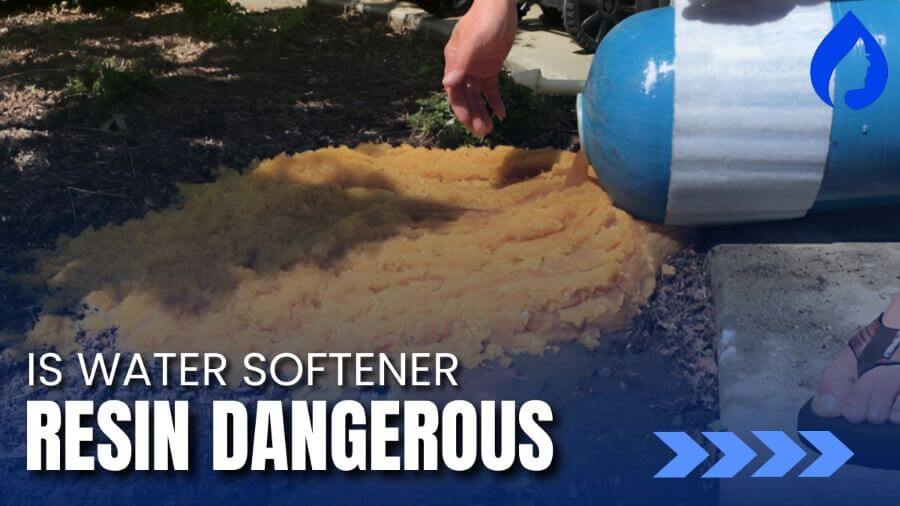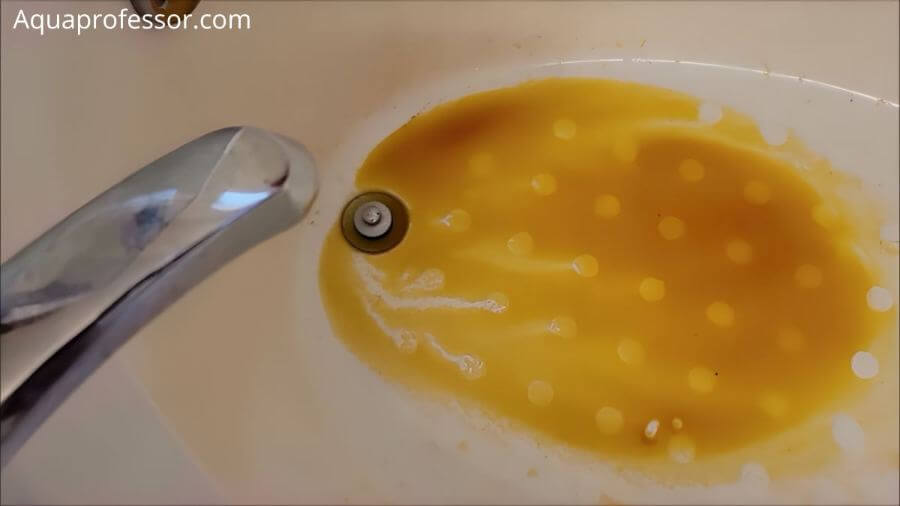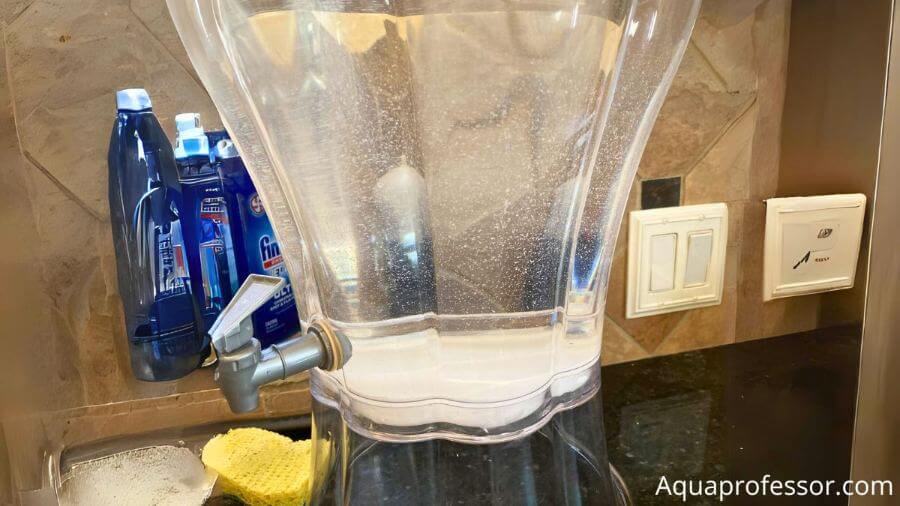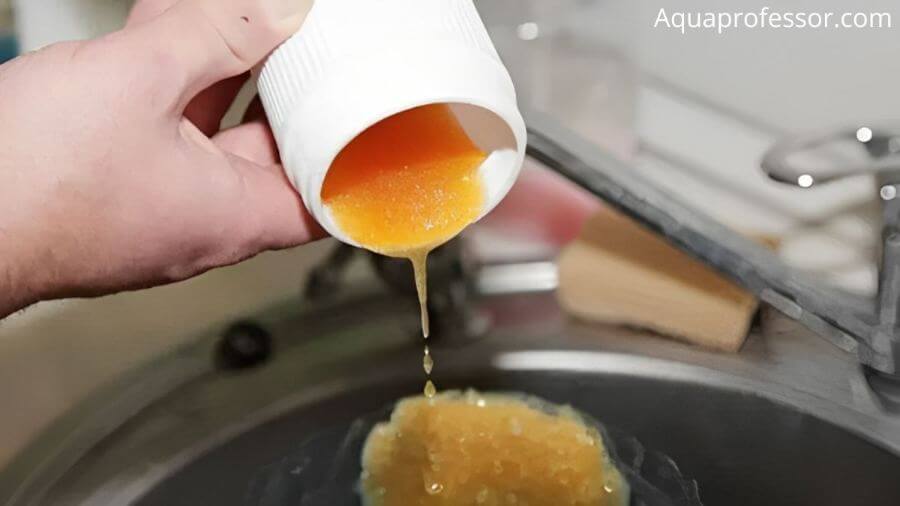
No, the water-softener resin isn’t dangerous as they’re designed to be stable and non-toxic.
However, the resin can leach away without proper maintenance or excess chlorine in feed water, increasing contamination risk and reducing softening efficiency.
Continue reading for a detailed explainer on whether water softener resin is toxic and how to dispose of it safely.
✅ Is It Safe To Drink Water With Resin In It?

While studies are limited about the potential health risks of resin-contaminated water, some side effects may include:
Furthermore, physical resin loss reduces ion exchange process efficiency, producing low or no softened water. That means all your hard water-related health problems, such as itchy, dry skin and hair, will return.
The best way to deal with this scenario is through regular maintenance. Remember to REGEN the water softener manually, or if you have the latest model, ensure a demand-initiated regeneration cycle.
Besides, you can use resin cleaner. It cleanses the ion-exchange resin beads and prevents them from leaching into drinking water.
Also Read: How to Use Iron Out Powder in a Water Softener
😕 How to Tell if Water Softener Resin Is Bad?
Here are three tell-tale signs that you have bad resin in your water softener:
🙅♂️You Are Not Getting Soft Water

Have you recently noticed detergent curds (semi-solid mass formation due to the reaction of hard water and detergent), reduced soap lathering, and white mineral spots on glassware, dishes, shower doors, and faucets?
Or is there hard water mineral buildup in your water appliances or within pipes?
These are signs that your ion-exchange water softener isn’t working correctly. And there are chances that the water-softener resin beads have lost their efficiency.
You can increase the REGEN cycle frequency to fix this issue temporarily. However, replacing the resin beads can help you in the long run.
💦Your Water Pressure Has Gone Down
Degraded resins may lead to low water pressure, limiting water flow to the brine tank.
Besides, these plastic resin beads may break down into small pieces and cause a clog, reducing water pressure.
Hard water in pipes because of reduced softening from bad resin can also result in pressure loss.
👃You Are Seeing Discolored Water With Foul Odor
Have you noticed cloudy, reddish-brown water lately from your taps? Or does your drinking water taste and smell different than it did before?
These are possible signs of water softener resin breakdown in your water supply and immediately need your attention.
If you want to increase the lifespan of the water-softening resin, consider using a prefilter for chlorine and iron.
Also, buy resin cleaners like Iron Out to remove rust or buildup of iron that impacts the function of resins.
Also Read: How Do You Test a Water Softener Resin?
♻ How To Dispose Of Water-Softener Resin?

As resin is synthesized from non-recyclable material (bulky and lightweight structural characteristics of polystyrene or other plastic), the proper disposal method is a common concern among homeowners.
Here’s a step-by-step guide:
Note:
It’s safe to dispose of water softener resins in the trash, but you should never flush the resin into the drain or dump it into a landfill, as this might lead to a clog and may cause environmental hazards.
Also Read: Where To Discharge Water Softener Backwash
📝 Is Water Softener Resin Dangerous? FAQs
How long does water softener resin last?
The lifespan of the resin beads in a water softener can be up to 10-20 years, depending on:
1. Water hardness level
2. Water usage
3. Resin quality (10% crosslinked is best)
4. Proper maintenance
If you see a reddish-brown color and metallic hard water taste more often, it’s time to replace the resin beads. Check out the manual for additional information on the resin’s life and quality.
How much does it cost to replace resin in a water softener?
Replacing resin in a water softener costs anywhere from $80 to $300. The cost of replacement differs based on:
1. The manufacturer’s brand
2. The quality of resin beads – good material and crosslink percentage (higher cross-linkage comes costly)
3. If professional help is needed (the service cost would add up)
What is water softener resin made of?
Water softener resin is mainly made by crosslinking polystyrene (a styrene polymer) and divinylbenzene (DVB), considered safe in the solid state.
Some characteristic features of these molecules include:
1. Porosity
2. Skeletal structure
3. 45% moisture, and
4. A size between 0.3 and 1.2mm
Does water softener resin dissolve?
No, water-softener resin doesn’t dissolve. As polystyrene is the primary building block of resin, it shows resistance against water and most chemicals.
Can ion-exchange resin be recycled?
No, ion-exchange resins can’t be recycled as they’re made of lightweight and bulky polymers which are hard to recycle and may contaminate other readily recyclable items.
Thus, it’s better to dispose of the ion-exchange resins in the trash following the safety protocols to avoid any environmental impact.
Adarsh is a Health & Nutrition Sciences graduate with expertise in environmental health. He is associated with ventures like Glacier Fresh Filter and Simpure Filter Systems. Through Aqua Professor, he intends to provide helpful information to every home to help them make smarter decisions.
